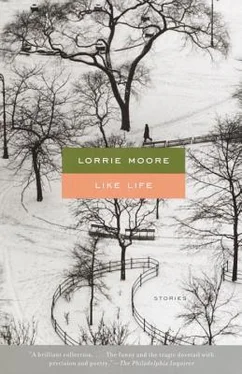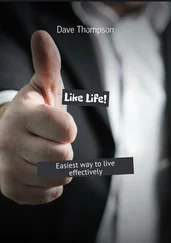“You’d think we’d be able to do a little better than this on your first night in America,” said Hane, poking with a serving spoon at the fried pallet of mashed potatoes, turnips, chopped broccoli, and three eggs over easy. “Millie here, as you probably know already, is devoted to recycling.” His tone was of good-natured mortification, a self-deprecating singsong that was his way of reprimanding his family. He made no real distinction between himself and his family. They were he. They were his feminine, sentimental side and warranted, even required, running commentary.
“It’s all very fine,” said John.
“Would you like skim milk or whole?” Millie asked him.
“Whole, I think,” and then, in something of a fluster, he said, “Water, I mean, please. Don’t trouble yourself, Mrs. Keegan.”
“In New Jersey, water’s as much trouble as milk,” said Millie. “Have whichever you want, dear.”
“Water, please, then.”
“Are you sure?”
“Milk, then, I guess, thank you.”
Millie went back into the kitchen to get milk. She wondered whether John thought they were poor and milk a little too expensive for them. The neighborhood probably did look shabby. Millie herself had been disappointed when they’d first moved here from the north part of town, after Ariel had started college and Hane had not been promoted to full professor rank, as he had hoped. It had been the only time she had ever seen her husband cry, and she had started to think of themselves as poor, though she knew that was silly. At least a little silly.
Millie stared into the refrigerator, not looking hungrily for something, anything, to assuage her restlessness, as she had when she was younger, but now forgetting altogether why she was there. Look in the refrigerator , was her husband’s old joke about where to look for something she’d misplaced. “Places to look for your mind,” he’d say, and then he’d recite a list. Once she had put a manila folder in the freezer by mistake.
“What did I want?” she said aloud, and the refrigerator motor kicked on in response to the warm air. She had held the door open too long. She closed it and went back and stood in the dining room for a moment. Seeing John’s empty glass, she said, “Milk. That’s right,” and promptly went and got it.
“So how was the flight over?” asked Hane, handing John a plate of food. “If this is too much turnip, let me know. Just help yourself to salad.” It had been years since they’d had a boy in the house, and he wondered if he knew how to talk to one. Or if he ever had. “Wait until they grow up,” he had said to Millie of their own two children. “Then I’ll know what to say to them.” Even at student conferences he tended to ramble a bit, staring out the window, never, never into their eyes.
“By the time they’ve grown up it’ll be too late,” Millie had said.
But Hane had thought, No, it won’t. By that time he would be president of the college, or dean of a theological school somewhere, and he would be speaking from a point of achievement that would mean something to his children. He could then tell them his life story. In the meantime, his kids hadn’t seemed interested in his attempts at conversation. “Forget it, Dad,” his son had always said to him. “Just forget it.” No matter what Hane said, standing in a doorway or serving dinner—“How was school, son?”—Michael would always tell him just to forget it, Dad. One time, in the living room, Hane had found himself unable to bear it, and had grabbed Michael by the arm and struck him twice in the face.
“This is fine, thank you,” said John, referring to his turnips. “And the flight was fine. I saw movies.”
“Now, what is it you plan to do here exactly?” There was a gruffness in Hane’s voice. This happened often, though Hane rarely intended it, or even heard it, clawing there in the punctuation.
John gulped at some milk and fussed with his napkin.
“Hane, let’s save it for after grace,” said Millie.
“Your turn,” said Hane, and he nodded and bowed his head. John Spee sat upright and stared.
Millie began. “ ‘Bless this food to our use, and us to thy service. And keep us ever needful of the minds of others.’ Wopes. ‘Amen.’ Did you hear what I said?” She grinned, as if pleased.
“We assumed you did that on purpose, didn’t we, John?” Hane looked out over his glasses and smiled conspiratorially at the boy.
“Yes,” said John. He looked at the ceramic figurines on the shelf to his right. There was a ballerina and a clown.
“Well,” said Millie, “maybe I just did.” She placed her napkin in her lap and began eating. She enjoyed the leftovers, the warm, rising grease of them, their taste and ecology.
“It’s very good food, Mrs. Keegan,” said John, chewing.
“Before you leave, of course, I’ll cook up a real meal. Several.”
“How long you staying?” Hane asked.
Millie put her fork down. “Hane, I told you: three weeks.”
“Maybe only two,” said John Spee. The idea seemed to cheer him. “But then maybe I’ll find a flat in the Big Apple and stay forever.”
Millie nodded. People from out of town were always referring to the Big Apple, like some large forbidden fruit one conquered with mountain gear. It seemed to give them energy, to think of it that way.
“What will you do? ” Hane studied the food on his fork, letting it hover there, between his fork and his mouth, a kind of ingestive purgatory. Hane’s big fear was idleness. Particularly in boys. What will you do?
“Hane,” cautioned Millie.
“In England none of me mates have jobs. They’re all jealous ’cause I sold the car and came here to New York.”
“This is New Jersey, dear,” said Millie. “You’ll see New York tomorrow. I’ll give you a timetable for the train.”
“You sold your car,” repeated Hane. Hane had never once sold a car outright. He had always traded them in. “That’s quite a step.”
THE NEXT MORNING Millie made a list of things for John to do and see in New York. Hane had already left for his office. She sat at the dining room table and wrote:
Statue of Liberty
World Trade Center
Times Square
Broadway 2-fors
She stopped for a moment and thought.
Metropolitan Museum of Art
Circle Line Tour
The door of the “guest” room was still closed. Funny how it pleased her to have someone in that space, someone really using it. For too long she had just sat in there doodling on her business cards and thinking about Michael. The business cards had been made from recycled paper, but the printers had forgotten to mention that on the back. So she had inked it in herself. They had also forgotten to print Millie’s middle initial — Environmental Project Adviser, Mildred R. Keegan — and so she had sat in there for weeks, ballpointing the R back in, card after card. Later Ariel had told her the cards looked stupid that way, and Millie had had to agree. She then spent days sitting at the desk, cutting the cards into gyres, triangles, curlicues, like a madness, like a business turned madness. She left them, absentmindedly, around the house, and Hane began to find them in odd places — on the kitchen counter, on the toilet tank. He turned to her one night in bed and said, “Millie, you’re fifty-one. You don’t have to have a career. Really, you don’t,” and she put her hands to her face and wept.
John Spee came out of his room. He was completely dressed, his bright hair parted neat as a crease, the white of his scalp startling as surgery.
“I’ve made a list of things you’ll probably want to do,” said Millie.
Читать дальше












